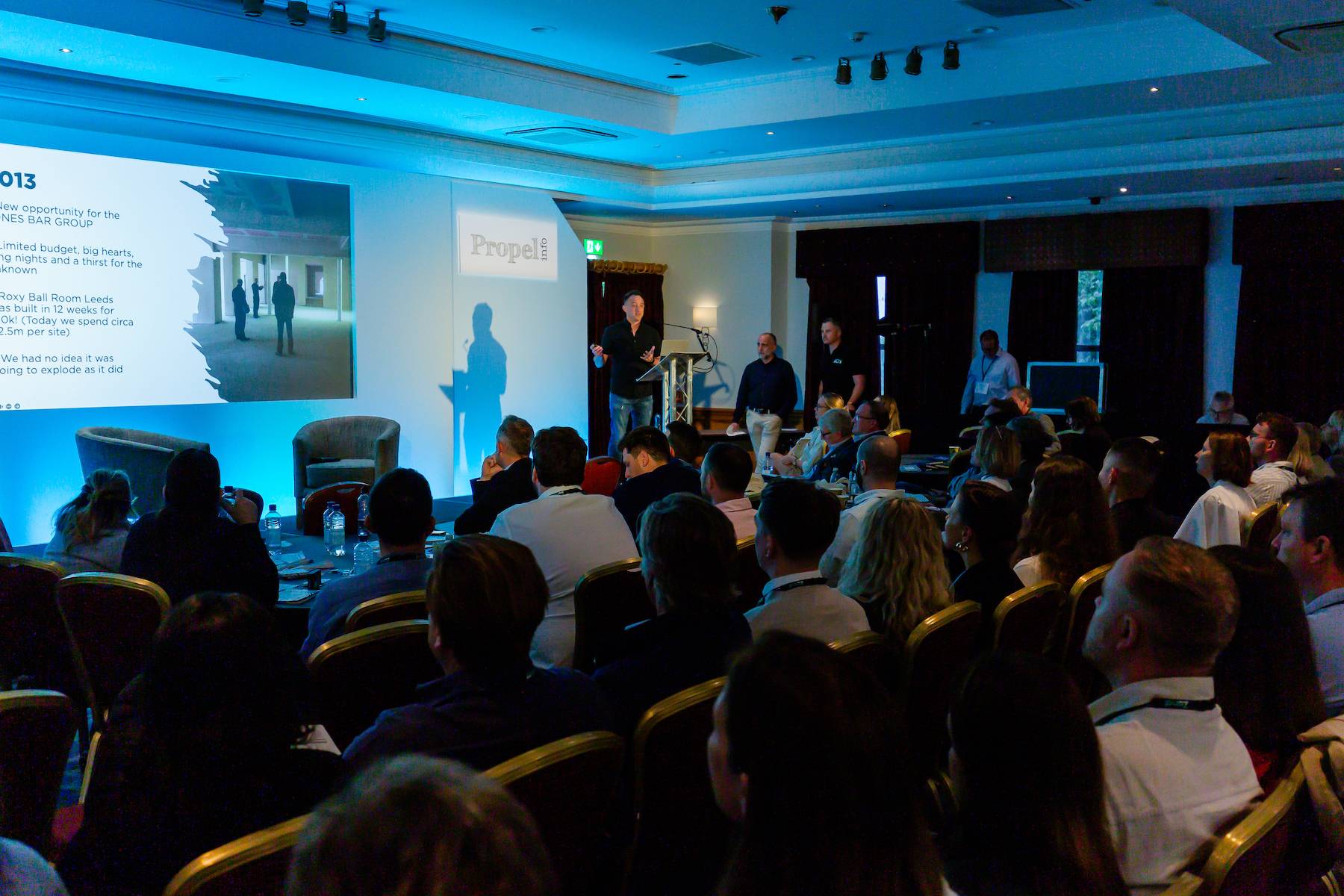
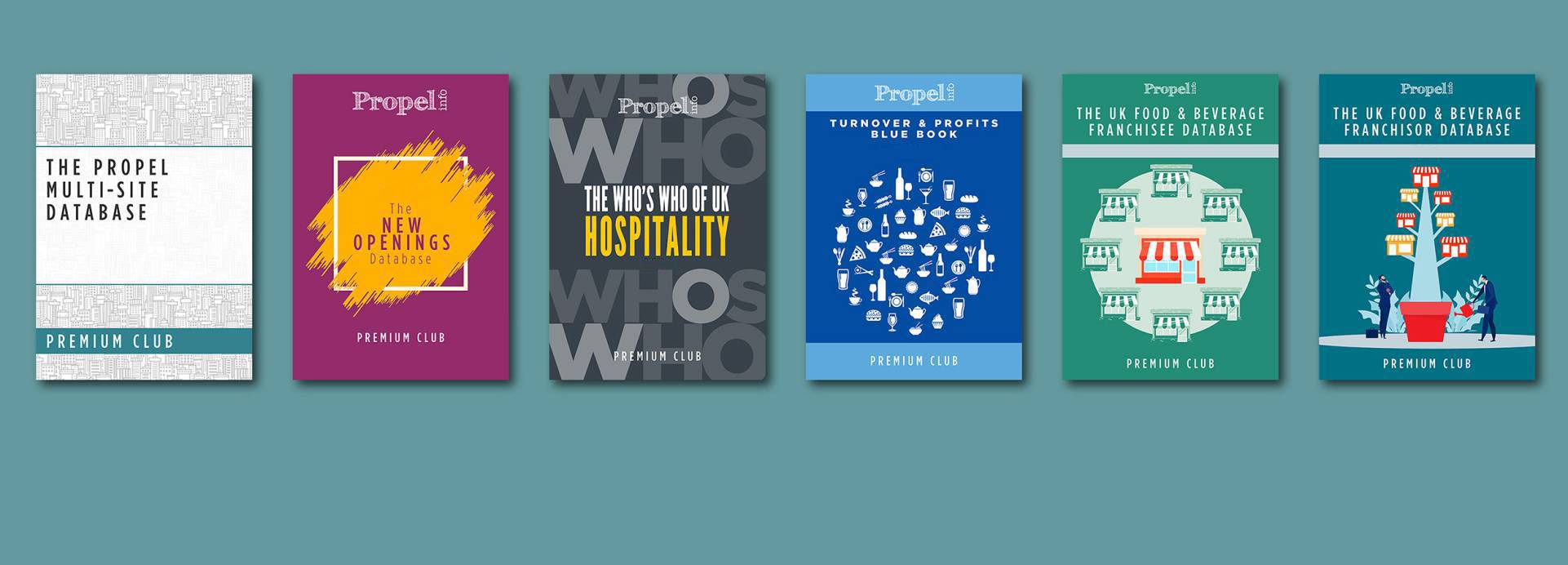

PREMIUM CLUB
Operators: £495 + VAT per year
Suppliers: £595 + VAT per year
Unlimited: £995 + VAT per year
Story of the Day - 5 March 2026
Foodservice price inflation flattens in January
Food and drink prices in the hospitality sector remained virtually flat in January, with month-on-month inflation slowing to just 0.02%, according to the latest Foodservice Price Index from NIQ and Prestige Purchasing. The deceleration follows a sharp festive surge in prices in December.
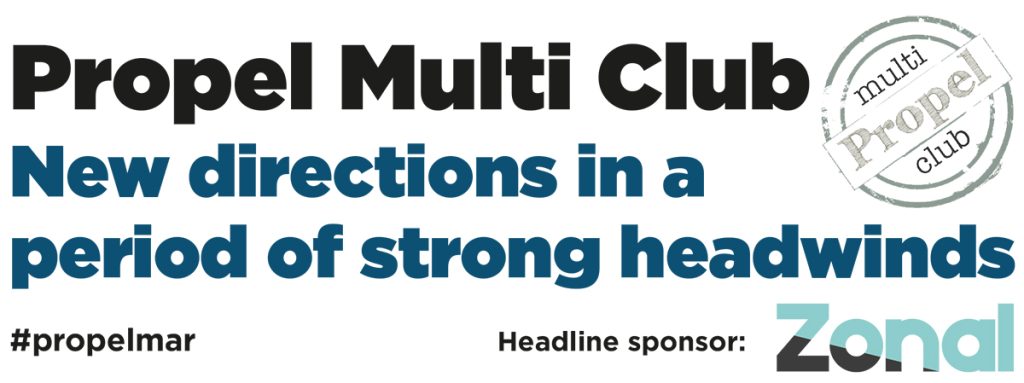

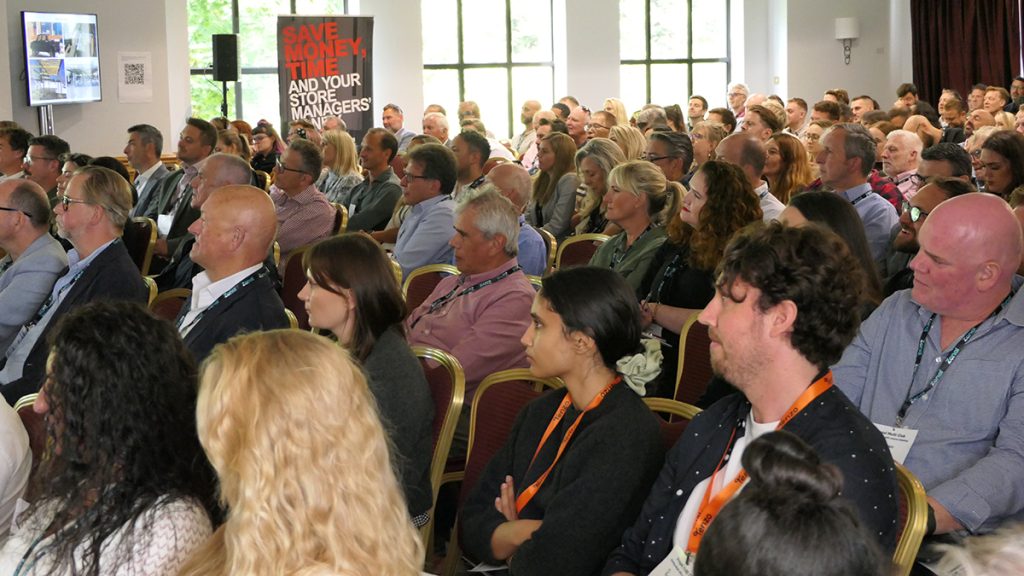
Operators of multi-site hospitality companies can book up to three free places, or operators who are Premium subscribers can claim up to four free places by emailing: kai.kirkman@propelinfo.com
Propel Exclusive Report
Propel's Experiential Leisure Report is available now
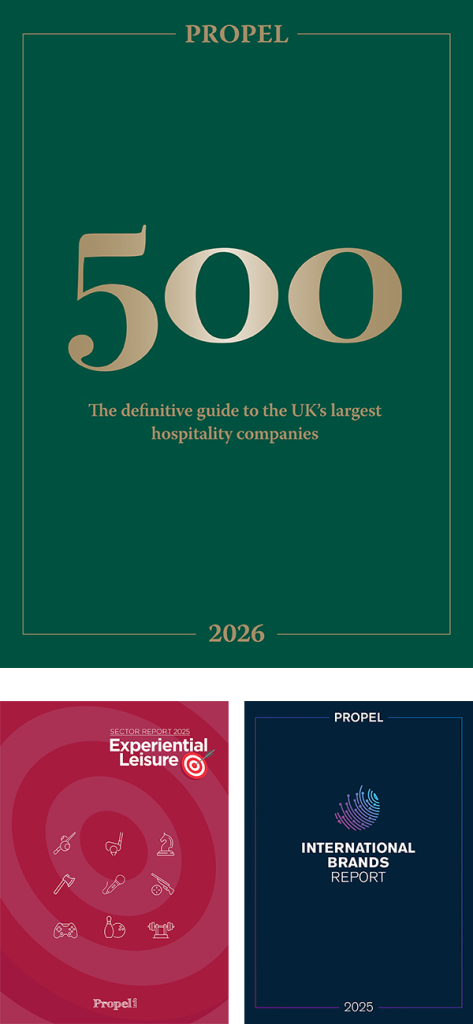
Propel 500 is back for the second year. It brings together the top 500 players shaping the industry, offering not only comprehensive listings but also deep insights into the forces driving growth, innovation, and transformation across the sector.
Propel 500 provides critical insights into the companies leading the charge in hospitality, including turnover, number of sites, key staff, and more.
The 45,000-word report also includes exclusive analysis providing a full understanding of the market’s dynamics, as the top companies in the sector shift position after a challenging year. Mark Wingett reviews the mergers and acquisitions changing the shape of the Top 500 as size increasingly matters. Katherine Doggrell examines the key developments in UK hotels and looks into one of the sector’s brightest lights; experiential leisure. Tim Street dissects the UK’s rapidly developing franchise market. Data expert Mark Bentley, business development director at HDI, looks at emerging growth sectors, and Meaningful Vision founder Maria Vanifatova analyses the latest trends in the quick service restaurant market.
Get the report
Propel’s 500 Report is available to Premium Club members for free.
To sign up to Premium Club email: kai.kirkman@propelinfo.com
5 March 2026
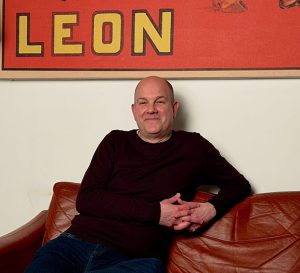
Chris Burford returns to Leon as CFO
Chris Burford (pictured) has returned to healthy food brand Leon as its chief financial officer, in a move the company said, “reunited founder John Vincent with one of the key figures behind the brand’s growth” and is a “step toward building the leadership team”. Burford first joined Leon in 2014 as director of finance, following a spell leading the finance function at Wagamama, and over the next seven years, became a central part of Leon’s leadership team.
5 March 2026

BrewDog CEO – BrewDog’s story is far from finished, Tilray exploring opportunities for experienced managers to franchise certain locations
James Taylor (pictured), chief executive of Scottish brewer and retailer BrewDog, which earlier this week was acquired out of administration by US firm Tilray Brands, has said company’s story “is far from finished” and that it now has a “home that understands what is required, understands the culture and can take this business forward to a bigger and better future”. Tilray acquired BrewDog’s worldwide intellectual property, UK brewing operations and a portfolio of 11 “premier and profitable brewpubs”, but 38 UK bars closed with immediate effect, with the loss of 484 jobs.
5 March 2026

Six by Nico restructures and refinances, decides not to proceed with crowdfunding campaign which raised £2.5m
Six by Nico has restructures and refinanced and decides not to proceed with a crowdfunding campaign which raised £2.5m. The concept, which was founded by chef Nico Simeone in 2017, opened the fundraise to the public in August, having raised more than £1.5m from early investors.
5 March 2026

Starbucks – new UK licensing agreement will bring ‘greater transparency and alignment around where and how we grow’.
Starbucks has said its new licensing agreement for the UK will bring “greater transparency and alignment around where and how we grow”. Propel revealed exclusively last month that Starbucks was reshaping its UK licensing structure after fears it had become too fragmented – dividing its UK operations into seven development territories.
5 March 2026

SSP appoints new chair
SSP Group, the UK operator of food and beverage outlets in travel locations worldwide, has hired a new chair. Andrew Martin has been named as chair, effective from 1 June, and will also assume the role of chair of the nomination committee. Andrew succeeds Carolyn Bradley, who has served as interim chair since 23 January 2026.
5 March 2026

Pasta Evangelist signs development agreement with Wendy’s franchisee
Pasta Evangelists has signed a multi-restaurant development agreement with Champion Brands, the umbrella vehicle which also oversees Blank Table, a franchise of US brand Wendy’s. The first site under the new agreement will open later this year in Cambridge.
5 March 2026

Remainder of Eclectic Bars business acquired by Capital Corporate Events owner
James Somers, owner of Capital Corporate Events, which oversees white collar boxing events in the UK, has been revealed as the acquirer of the remaining sites in the Eclectic Bars business. Previously owned by the Brighton Pier Group, Somers has acquired Embargo Republica in Chelsea and Le Fez in Putney in the capital.
5 March 2026
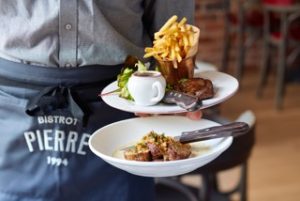
Bistrot Pierre co-founder named chair of Nottingham tapas group
John Whitehead, the co-founder of Bistrot Pierre, has been named chairman of the Perkins-family led, Nottingham-based tapas group which operates the Baresca and Escabeche concepts. Whitehead launched Bistrot Pierre in Nottingham in 1994 with childhood friend Rob Beacham and grew the business to circa 25 sites nationally.
5 March 2026
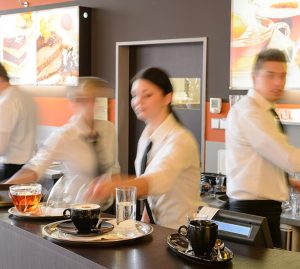
High staff churn linked to seasonal sales decline
High rolling staff churn in the first half of the year leads to weaker revenue performance in the second half, according to industry-wide analysis from people and data specialist Pineapple, in partnership with AI-native workforce management software provider Sona. The two company’s 2025 H2 Insights Report, which analyses workforce and financial data from more than 35,000 employees across 75 national hospitality brands, indicates a strong correlation between high rolling staff churn in the first and second quarters and weaker revenue performance in the third and fourth.
4 March 2026

BrewDog co-founder James Watt – ‘at times we expanded too fast and diversified too broadly’
James Watt, co-founder of Scottish brewer and retailer BrewDog, has said at times the business “expanded too fast and diversified too broadly” under his leadership. On Monday (2 March), US firm Tilray acquired BrewDog’s worldwide intellectual property, UK brewing operations and a portfolio of 11 “premier and profitable brewpubs” for £33m, but 38 UK bars closed with immediate effect, with the loss of 484 jobs.
4 March 2026

US Tex-Mex casual dining brand seeking UK entry
US Tex-Mex casual dining brand Chili’s Grill & Bar, which has more than 1,600 locations worldwide, is seeking an entry into the UK market. Chili’s was founded in Texas in 1975 by Larry Lavine and is currently owned and operated by US company Brinker International, which also owns the Maggiano’s Little Italy brand.
4 March 2026

UKHospitality – ‘if government wants to deliver growth everywhere for everybody, then it needs to recognise sector is best placed to deliver that’
UKHospitality has told the government if it wants to deliver growth “everywhere for everybody” then it needs to recognise the sector is best placed to deliver that across the country. In the spring statement delivered by chancellor Rachel Reeves (pictured), the Office for Budget Responsibility indicated gross domestic product will increase by 1.1% in 2026, down from the 1.4 % it forecast in November.
March 2026 ~ Premium Club

Premium Club readers to receive all the videos from Restaurant Marketer and Innovator. Propel Premium Club members are to be given access to the entire recording of the 2026 Restaurant Marketer & Innovator Conference. Members are now able to access all the videos of the event.
James Hacon, managing partner at Think Hospitality.
Maria Vanifatova, chief executive and founder of Meaningful Vision.
Mark Bentley, business development director at HDI.
Sara McKennedy, managing director at Coco di Mama, Éadaoin McDonagh, chief operating officer at White Rabbit Projects, Laura Irving, managing director at JKS Restaurants, and Marcel Khan, chief executive at Fulham Shore. Romy Miller, chief marketing officer at Knoops.
Pho: Libby Andrews, marketing director at Pho, talks to Charlotte Mair, founder and managing director at The Fitting Room. Dishoom: In conversation with Fleet Street Communications chief executive Mark Stretton, co-founder Kavi Thakrar.
Alexis Melikov, chief executive of Tigermilk. Jordan Graham, founder of Sugar Snap, in conversation with Paul Catterson, director at Orto Pizza, Sam Shephard, founder at Juice Jar, andPeter Coleman, co-founder of Seed
Aqua at 25: stories beyond the view: Marie Guenot, marketing director at Aqua Restaurant Group. Michael Radley, co-founder at Joli, is joined by Hilary Ansell, marketing consultant and interim marketing director at Wasabi, Hester Mitchell, digital marketing manager at Bleecker Burger, and Tom Patrick, marketing director for Banana Tree and Las Iguanas at Big Table Group.
Evie Horsell, head of communications UK & Ireland at Big Mamma Group
Russell Danks, managing director at Laine Pub Co,
Kiran Quinn, group marketing director at RedCat Hospitality
Laura Lewis, marketing director at Arc Inspirations.
David Tester, head of marketing at Franco Manca, is joined by George Lamb, co-founder of Wildfarmed
Five concepts, one vision — Incipio at Olympia: Rory Graham, marketing and brand director at Incipio Group.
Jayson Perfect, chief operating officer at Butcombe.
What’s Next in Hospitality? The 2026 Playbook: James Hacon, Managing Partner at Think Hospitality. Katy Moses, managing director at KAM. Heleri Rande, partner at Think Hospitality, in conversation with Chris Miller, founder at White Rabbit Projects, Loui Blake, co-founder at Long Lane, and Nicci Clarke, marketing and culinary director UK at Sodexo Live! Anthony Knight speaks to Tom Kidd, founder of SetList.
When hospitality meets entertainment. Thinking out of the box: Michelle Farrell, chief growth officer at Boxpark.
The neighbourhood effect: Marshall Dallas, Partner at Think Hospitality, speaks with Ankur Wishart, co-founder at Boxcar, and India Filippidis, head of marketing at Boxcar & The Italian Greyhound. Madeleine Phillips, marketing director at Various Eateries.
Deborah Jones, senior client success manager at Proinsight, speaks to Michael Farquhar, chief operating officer at ETM Group.
Krishnan Doyle, founder at COREcruitment.
The multi-concept challenge: Markus Thesleff, founder of Thesleff Group.
Dave’s Hot Chicken’s digital activation: Peter Critchley, UK chief executive at Trison, is joined by Keyana Mohammadi, head of marketing at Dave’s Hot Chicken. Tessa Graham, group brand director at Tashas Group. Olivia Fitzgerald, managing director at 125 Data & Insights, speaks with Tom James, managing director at Bill’s. Dan Brookman, chief executive and co-founder of Airship & Toggle. Daniel Bennett, global head of behavioural science at Ogilvy Consulting: Originality in the age of AI. Heleri Rande, partner at Think Hospitality, in conversation with Afroditi Krassa, founding director of Afroditi, and Bob Conwell, managing director at Mr Lyan Studio. Digital marketing for growth. Carey Benn, chief executive at Guestwise, in conversation with Naddy Onions, marketing director at Prezzo Italian, James Metcalfe, sales and marketing director at Urban Pubs & Bars, and Ewa Turney, senior product lead at Mitchells & Butlers. Aaron Morgan, head of marketing and Paul Jones, head of IT at The Alchemist. Dojo: Jon Knott, head of data projects at Dojo. Laura Vana, associate partner at Think Hospitality, in conversation with Kat Schofield, sales and marketing director at Permanently Unique Group, Holly Hilton, marketing director at Market Place Food Halls, and Ria Pattni, director of marketing at JKS Restaurants. Laura Vana, associate partner at Think Hospitality, in conversation with Tasos Gaitanos, co-founder at Brother Marcus, Alex Large, co-founder at Brother Marcus, Tommy Giraux, head of restaurant systems at Honest Burgers. Joe Comiskey, digital director at Stonegate Group. Joel Robinson, chief executive at Openr, in conversation with Toby Herbert, head of IT at Hall & Woodhouse, Sara McKennedy, managing director at Coco di Mama, and Mark Bentley, business development director at HDI. Sophie Clarke, UK team lead at Popmenu, in conversation with Charlie Wood-Jones, Co-founder at Cawsburger. Dan Brookman, chief executive at Airship and Toggle. Mark Warburton, founder of Cow & Sow and Alan Armstrong, fractional marketing director.
By joining Propel Premium Club members get access to essential insight through Propel Opinion pieces from leading industry commentators, plus our industry-leading databases, receive hospitality’s foremost newsletter first, watch vital video content and get event discounts.
March 2026 ~ Premium Club
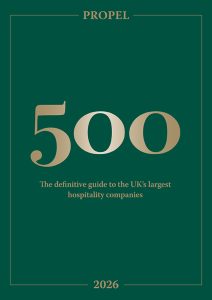
Propel 500 is back for the second year. It will bring together the top 500 players shaping the industry, offering not only comprehensive listings but also deep insights into the forces driving growth, innovation, and transformation across the sector. Propel 500 will provide critical insights into the companies leading the charge in hospitality, including turnover, number of sites, key staff, and more. The 45,000-word report will also include exclusive analysis to provide a full understanding of the market’s dynamics, as the top companies in the sector shift position after a challenging year.
Mark Wingett will review the mergers and acquisitions changing the shape of the Top 500 as size increasingly matters.
Katherine Doggrell will examine the key developments in UK hotels and look into one of the sector’s brightest lights; experiential leisure.
Tim Street dissects the UK’s rapidly developing franchise market.
Data expert Mark Bentley, business development director at HDI, will look at emerging growth sectors, and Meaningful Vision founder Maria Vantifatova will analyse the latest trends in the quick service restaurant market.
Propel 500 will be released on Friday, 9 January at 9am and is
£595 plus vat.
Existing Premium Club Members can receive it on Friday, 9 January at 9am for
£395 plus vat.
Premium Club members will receive the report for free on Friday, 27 February at 9am.
Pre-order Propel 500 today by emailing: kai.kirkman@propelinfo.com
By joining Propel Premium Club members get access to essential insight through Propel Opinion pieces from leading industry commentators, plus our industry-leading databases, receive hospitality’s foremost newsletter first, watch vital video content and get event discounts.
March 2026 ~ Premium Club

Premium Club Opinion provides weekly insights from industry leaders. In this current edition, James Hacon, managing partner at Think Hospitality Consulting, explains why London remains one of the most powerful restaurant stages in the world. He argues that, despite cost pressures and labour shortages, London remains one of the world’s most desirable restaurant markets. Strong West End leasing data, minimal vacancies and rising rents signal sustained demand. International operators, particularly from the Middle East and US, view a London opening as a mark of credibility and global positioning. Like New York, London acts as a blank culinary canvas and global amplification engine. Though margins can be tighter than elsewhere, prime London’s experience density, capital confidence and cultural magnetism make it a powerful launchpad for ambitious brands. Meanwhile, Stuart Gillies, former chief executive of Gordon Ramsay Holdings, shares how lessons from large-group leadership can be applied to small, regional restaurants, with the help of technology and AI. After leading a global restaurant group, Gillies found running a small collection requires fewer meetings but a similar forward-planning strategy. Still viewing the business as a start-up, they review strategy frequently and prioritise team empowerment, useful AI-driven data and staff wellbeing. Staying close to operations enables faster development. Experiments like a robot waiter sparked debate, highlighting cautious openness to innovation. Lastly, Propel’s deputy editor Tim Street talks to Richard Zivkovic, who after almost three decades in the corporate world, has now opened a café-bakery in his home town. After nearly 30 years in senior roles at brands including Pret A Manger, Costa Coffee and Island Poke, Richard Zivkovic left corporate life to co-found Helg, a Scandinavian-inspired café-bakery in Stevenage, with his wife. Seeking family time and community connection, he embraces hands-on hospitality, rapid experimentation and local sourcing. Trading profitably in year one, the pair balance growth ambitions with sector-wide cost challenges.
By joining Propel Premium Club members get access to essential insight through Propel Opinion pieces from leading industry commentators, plus our industry-leading databases, receive hospitality’s foremost newsletter first, watch vital video content and get event discounts.
march 2026 ~ Premium Club

Mark Wingett’s Premium Club Diary delivers insider sector gossip every week to Premium Club members. In this week’s edition, competitive socialising continues to gather pace. In 2022, Mitchells & Butlers launched interactive darts concept Arrowsmiths in Solihull, rolling it out to 14 sites, mainly under O’Neill’s. The group is now quietly trialling a golf-themed format, Puttside, signalling further diversification. Meanwhile, Swingers co-founder Matt Grech-Smith is departing following the brand’s US expansion to Boston, marking six global venues. Elsewhere, Young’s plans to shift to the London Stock Exchange’s main market while targeting further London growth, considering both freeholds and premium leases, and hinting at selective acquisitions. Expansion momentum continues as Sandwich Sandwich prepares a grab-and-go launch at Paddington station, eyeing transport hubs as catalysts for wider growth. In tech, Burger King owner Restaurant Brands International is piloting AI-powered headsets in 500 US restaurants. The “Patty” system provides operational alerts, recipe guidance and customer service coaching, positioning AI as a real-time management and hospitality enhancement tool.
By joining Propel Premium Club members get access to essential insight through Propel Opinion pieces from leading industry commentators, plus our industry-leading databases, receive hospitality’s foremost newsletter first, watch vital video content and get event discounts.
4 March 2026

Chaiiwala co-founder – ‘we've been flooded with enquiries from would-be US franchisees’
Sohail Ali, co-founder of Indian street food brand Chaiiwala, has told Propel the business has been “flooded with enquiries” from prospective US franchisees, while it is simultaneously building the infrastructure required to support its long-term ambitions in the States. Chaiiwala, which was founded in Leicester in 2015 and currently operates circa 115 sites across the UK, 23 in Canada, and a handful in Dubai, has a strategy in place to scale up to 500 global locations over the next ten years.
4 March 2026

Simmons reports profit and turnover boost
Hertfordshire bakers Simmons has reported a boost in profit and turnover for the year to 30 March 2025. The company, which dates to 1838 and has 43 shops spread across Hertfordshire and Bedfordshire, reported a 7.1% turnover increase for the year, from £31,053,518 in 2024 to £33,285,834.
4 March 2026

Gordon Ramsay to open UK’s first Hell’s Kitchen site at London’s Cumberland Hotel next month
Chef Gordon Ramsay (pictured) is to open the first UK restaurant under his Hell’s Kitchen concept at the 900-room Cumberland Hotel, in London’s Marble Arch, next month. The opening is the first of the new partnership between Clermont Hotel Group and Gordon Ramsay Restaurants, which will see the latter open branded dining concepts across the former’s portfolio.
4 March 2026

Evolv Collection aiming for ‘Michelin recognition’ from new iteration of Orrery
The Evolv Collection, formerly D&D London, has said it is aiming for “Michelin recognition” from new iteration of Orrery, its French restaurant in London’s Marylebone. The restaurant – which was listed in the Michelin Guide until February 2025 and previously held a Michelin star under Chris Galvin – will reopen on Thursday, 26 March as Orrery by Pierre Minotti under executive chef Pierre Minotti, formerly of two-Michelin-starred Alex Dilling at Hotel Café Royal.
4 March 2026

McDonalds to invest €150m on expanding in Ireland over next five years
McDonald’s plans to open 25 new restaurants across Ireland over the next five years, investing €150m (£130.8m) in expanding its operations in the country. The company said approximately 1,750 jobs will be added through the addition of five new restaurants each year, with McDonald’s planning to open its 100th restaurant in Ireland next year, which will coincide with its 50th anniversary since first establishing a presence in Ireland in Dublin’s Grafton Street.
4 March 2026

Mehdi Gashi named CEO of Storia
Mehdi Gashi has been named chief executive of Storia, the Italian restaurant business founded by ex-Prezzo chief executive Jonathan Kaye. Gashi has been a director of the six-strong business since its launch in spring 2021.
4 March 2026

London workplace caterer Vacherin evolves leadership to prepare for next era of growth
London workplace caterer Vacherin, part of Compass Group UK & Ireland, is evolving its leadership to prepare for the next era of growth. Tom Rule has been promoted to managing director designate, with Phil Roker, Vacherin’s incumbent managing director, preparing to move into the role of chairman later in 2026.
3 March 2026

Former BrewDog Bars CEO on BrewDog closures – ‘government policy made profitable bars marginal’
James Brown, chief executive of Brava Hospitality Group, and former chief executive of BrewDog Bars, has called the closure of 38 of the Scottish brewer and retailers bars a “very sad day that unfortunately many of us could see coming” as government policy on rates and employment taxes has turned profitable bars into marginal ones. Yesterday (Monday, 2 March), US firm Tilray acquired BrewDog’s worldwide intellectual property, UK brewing operations and a portfolio of 11 “premier and profitable brewpubs”, but 38 UK bars closed with immediate effect, with the loss of 484 jobs.

Watch highlights from this year’s Propel summer conference and party.
Video presentations of all the speakers are available to Premium Club members, join to unlock exclusive access to 100 insightful videos each year.
To view pictures from the event click here
Promotional Content
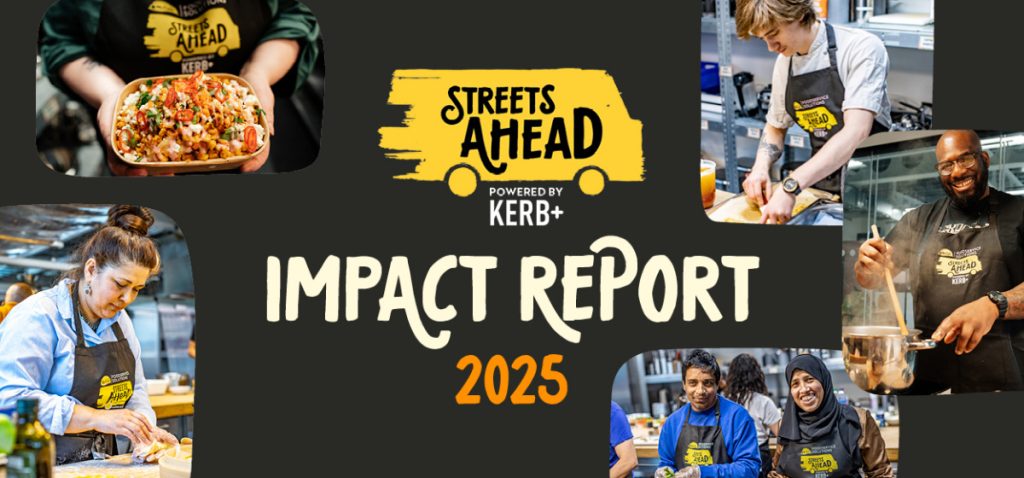
22 April 2025
Unlock the Power of Change: Download McCain's Impact Report Today!
McCain’s Streets Ahead Programme, powered by KERB, is transforming the UK street food scene by empowering the next generation of entrepreneurs, particularly those facing barriers to entering the hospitality industry.

7 October 2024
Meet Maral, the visionary behind Ayal: Sharing Turkmenistan’s Flavours with London’s Streets
With the help of the McCain Streets Ahead programme, Maral turned her dream into a thriving business. Through Ayal, she offers Londoners a taste of Turkmen cuisine, from Manti dumplings to traditional palav, highlighting the rich heritage of her culture.
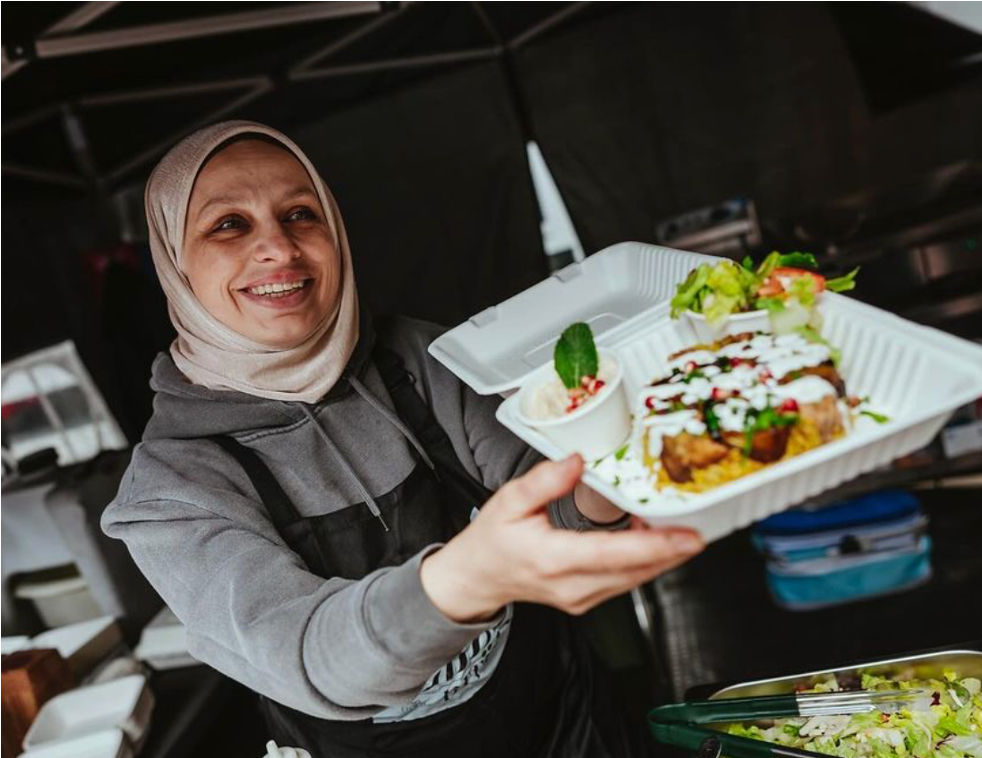
9 September 2024
Meet Eman and Bisan Bites: Bringing Palestinian Flavours to London's Streets
In 2022, Eman embarked on a journey to bring the authentic taste of Palestinian cuisine to the street food scene of London. Seeking guidance from the Streets Ahead programme, she transformed her passion into a reality, creating Bisan Bites a business that celebrates her heritage.

17 July 2024
Taste Uzbekistan: The Street Food Duo sharing the traditions and flavours of Central Asia
In 2022, Akbar and Sanobar joined the Streets Ahead program with a clear vision: to become the ultimate destination for food enthusiasts seeking an authentic and immersive experience.
Never Miss a Story
Subscription Plans
Standard
- Receive the Morning Briefing newsletter
- Receive Breaking News
- Exclusive access to 100 videos from Propel conferences & webinars
- In Conversation podcast series with industry leaders
- Receive the International Brands Report
- Receive the 500 Report
- Receive the Experiential Leisure report
- 20% discount on tickets to five Propel paid-for events
- Operators can send up to four members of staff to each of our four Multi-Club Conferences for free
- Receive the Propel database of multi-site companies, updated every month
- Receive the Propel Turnover & Profits Blue Book, updated every month
- Receive the Propel database of new openings, updated every month
- Receive the Propel UK Food and Beverage Franchisor database
- Receive the Propel UK Food and Beverage Franchisee database
- Receive the Who’s Who of UK Food and Beverage database
- Read Propel insight editor Mark Wingett’s weekly analysis and City Diary
- Plus insight from leading commentators
Premium Club
Supplier: £595 + VAT / per year
- Receive the Morning Briefing newsletter 11 hours early at 7pm each evening
- Receive Breaking News
- Exclusive access to 100 videos from Propel conferences & webinars
- In Conversation podcast series with industry leaders
- Receive the International Brands Report
- Receive the 500 Report
- Receive the Experiential Leisure report
- 20% discount on tickets to five Propel paid-for events
- Operators can send up to four members of staff to each of our four Multi-Club Conferences for free
- Receive the Propel database of multi-site companies, updated every month
- Receive the Propel Turnover & Profits Blue Book, updated every month
- Receive the Propel database of new openings, updated every month
- Receive the Propel UK Food and Beverage Franchisor database
- Receive the Propel UK Food and Beverage Franchisee database
- Receive the Who’s Who of UK Food and Beverage database
- Read Propel insight editor Mark Wingett’s weekly analysis and City Diary
- Plus insight from leading commentators
Premium Club Unlimited
- Unlimited access for your company
- Receive the Morning Briefing newsletter 11 hours early at 7pm each evening
- Receive Breaking News
- Exclusive access to 100 videos from Propel conferences & webinars
- In Conversation podcast series with industry leaders
- Receive the International Brands Report
- Receive the 500 Report
- Receive the Experiential Leisure report
- 20% discount on tickets to five Propel paid-for events
- Operators can send up to four members of staff to each of our four Multi-Club Conferences for free
- Receive the Propel database of multi-site companies, updated every month
- Receive the Propel Turnover & Profits Blue Book, updated every month
- Receive the Propel database of new openings, updated every month
- Receive the Propel UK Food and Beverage Franchisor database
- Receive the Propel UK Food and Beverage Franchisee database
- Receive the Who’s Who of UK Food and Beverage database
- Read Propel insight editor Mark Wingett’s weekly analysis and City Diary
- Plus insight from leading commentators
Conferences, study trips, and propel multi club
Upcoming Events

March 25th 2026
Propel Multi Club — New directions in a period of strong headwinds
Operators of multi-site hospitality companies can book up to three free places, or operators who are Premium subscribers can claim up to four free places by emailing: kai.kirkman@propelinfo.com

